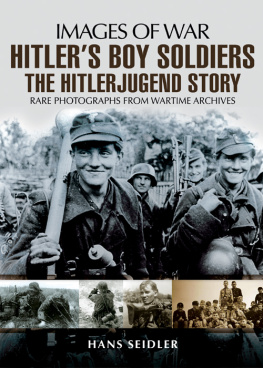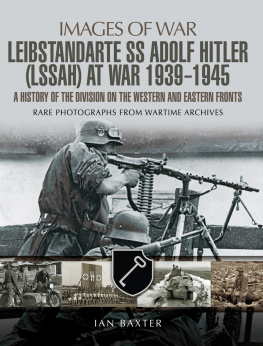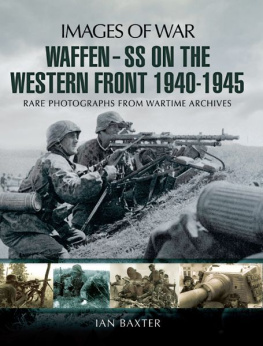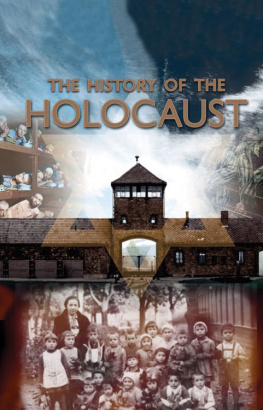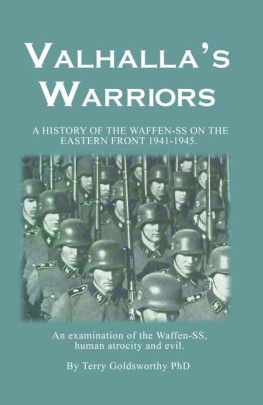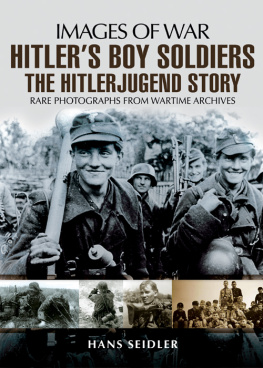THE
SS
A BOUT THE AUTHOR
Robert Lewis Koehl was formerly Professor of History at the University of Wisconsin-Madison. He has researched the SS for more than thirty years and has published widely in the field. He lives in Madison in Wisconsin.
THE
SS
A HISTORY
1919 - 45
ROBERT LEWIS KOEHL
Cover illustrations: (Front) Massed ranks of Allgemeine-SS at a Nuremburg rally.
First published 1989
This edition first published 2004 by Tempus Publishing
The History Press
The Mill, Brimscombe Port
Stroud, Gloucestershire, GL 5 2 QG
www.thehistorypress.co.uk
This ebook edition first published in 2012
All rights reserved
Robert Lewis Koehl, 1989, 2000, 2004, 2012
The right of Robert Lewis Koehl, to be identified as the Author of this work has been asserted in accordance with the Copyrights, Designs and Patents Act 1988.
This ebook is copyright material and must not be copied, reproduced, transferred, distributed, leased, licensed or publicly performed or used in any way except as specifically permitted in writing by the publishers, as allowed under the terms and conditions under which it was purchased or as strictly permitted by applicable copyright law. Any unauthorised distribution or use of this text may be a direct infringement of the authors and publishers rights, and those responsible may be liable in law accordingly.
EPUB ISBN 978 0 7524 8689 5
MOBI ISBN 978 0 7524 8688 8
Original typesetting by The History Press
CONTENTS
INTRODUCTION
The men in the black coats were, after all, men. Many but by no means all of them donned these coats as other men in other lands and other times might put on ritual masks and join in strange dances, to propitiate a threatening nature. They became otherwise and acted like men possessed. Such persons, both in their own consciousness and in that of their countrymen, acted for others in the German community who therefore did not have to participate directly in the ritual. Thus, they were permitted to torture and kill, to conquer and destroy, and to take part in a theatrical production of immense proportions. Yet this drama and its props remained exactly what it was for other ordinary men, both German and non-German: tinsel and cardboard.
Especially in the Waffen-SS (the garrisoned military wing of the SS), in the field-grey of the front, SS men sought later to escape the curse of these same black coats, to become just soldiers like the others. Indeed, in the field-grey uniform also, they were only men. But their SS past, the patterns of soldiering and of German society, as well as National Socialist power politics, thrust many of them into brave exploits, ruthless savagery and thoughtless destruction. An SS unit of the Wehrmacht could never be just another military unit, although many of its officers and men were rather ordinary individuals. Tradition, that familiar concept in military annals, had its influence in the SS too and not always as desired by SS commanders or by SS volunteers forcing the man to become both more than himself, and a good deal less.
Adolf Hitler experienced this once in the uniform of the Bavarian Infantry. When the overlays of myth surrounding his military service have been removed, he too emerges as an ordinary man, whose Austrian accent was not erased by the uniform and who did not become a comrade or a hero yet nonetheless was stretched (and not merely inflated) into something new. This happened not merely for Hitler but for all the men who had grown up and lived in peacetime. The front generation of 191418 was neither more nor less creative than its fathers. Its members made do with what they had, as all men do; and what they improvised out of their emptiness and their very partial fulfilment became their messages to the civilian world to which they were forced to return as arbitrarily as they were forced to leave it in 1914. None of the foregoing was unique to Germany; France, Britain, Italy, eastern Europe, and even Russia and the United States experienced the returned civilian-soldier as an alien if not an enemy, a confused and impatient reformer. Yet to the degree that each country, each environment, could replace what had been lost (or squeezed out) of the war veteran, that man gradually reintegrated himself into the civilian world. Individuals vary due to an infinite, or almost infinite, set of early influences, so that again in Germany as everywhere there were many exceptions. There was, after all, not much of a common denominator to front experience. There was only a potential common denominator of a common uniform, to which the conditions of post-war Europe could then add content: defeat, disgrace, hopeless job conditions, political instability and moral anarchy.
It is a commonplace today that National Socialism was not Germanys inevitable fate any more than Soviet Communism was Russias. The action and inaction of countless millions, by no means all of them in Germany or Russia, led to consequences of which they themselves were neither the masters nor choosers. But individuals did choose, did plan, did act; and these choices, plans and acts had the consequences of Communism and National Socialism because of complex but not incomprehensible patterns of human behaviour, especially institutional behaviour. German institutions, and especially the processes of change in these institutions, provide the matrix in which individual goals, responses, improvisations and concepts lead to predictable social and political consequences. Popular monarchy could become the Weimar presidency, ready for conversion into dictatorship; the Prussian army could evolve into the school of the nation with potential for becoming a Volksheer (peoples army) or an elite cadre or both. Germany evolved into National Socialism without choosing it; individual Germans, faced with overwhelming changes in the framework of their lives, their expectations, their assumptions, their timetable of existence, chose, planned and acted National Socialism.
The Schutzstaffel (Guard Squadron) did not spring in a trice from Hitlers forehead. It is remarkable enough how much of the SS did lie embryonically in the minds of Hitlers generation even before 1914. But the reality of the SS could only take shape gradually in the experience which the Nazis had in confronting the political exigencies of post-war Germany, with the naive imagery of pre-1914 youth. Membership of the bodyguard of any leader implies ones own importance: even the power of the strong man is incomplete without the guardsman. Since the academic soothsayers had created an elaborate modern justification for what so many men in different times and ages have craved, a messiah, Adolf Hitler could gradually evolve himself into a magical, quasi- religious Fhrer, the chief of a holy band of crusaders, the political soldiers of a super pressure group. To be his bodyguard was to partake of his charisma, to be important to him. This sense of a special relationship to god-on-earth was a gift of grace Hitler knew very well how to foster among his alienated, petit bourgeois followers long before 1933; yet his grace was not limited to the SS. This special relationship was merely there, ready to be elaborated if the opportunity arose, by the right man. All the characteristics of the SS were not inevitable in National Socialism. Himmler, R.W. Darr, and Reinhard Heydrich each made large contributions. Hitler himself started out with the bodyguard idea. Wilhelmine Germany spawned dozens of Teutonic secret societies; eugenic breeding schemes were not limited to pre-war Germany. No one Nazi invented the SS, but much of its design reproduces the mental furniture of post-war Munich and the Class of 1900 Heinrich Himmlers age-mates. (This term refers to the birth cohort of a given year and is derived from military calculations.)


